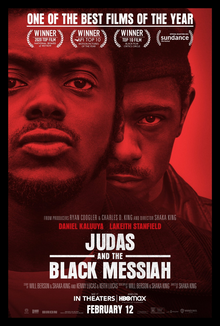‘Judas and the Black Messiah’ puts a spotlight on the story of revolutionary Fred Hampton

Warner Bros. Pictures [Fair Use]
Judas and the Black Messiah tells the story of the betrayal between members in the Black Panther Party in 1960’s Chicago.
March 25, 2021
I learned more about the Black Panthers in two hours watching “Judas and the Black Messiah” than I ever have in school. The stunning historical thriller, which was recently nominated for multiple Academy Awards, including best picture and best original screenplay, follows William O’Neal, an FBI informant who infiltrated the Illinois Black Panther Party and provided the information that led to the assassination of party chairman, Fred Hampton.
The Black Panther Party was first founded to challenge police brutality against the Black community. However, as it spread across the country and became more influential, it became increasingly monitored by the FBI, as seen in the film. The film also touches on other events that took place involving the Black Panther Party at the time, such as the formation of the Rainbow Coalition, an alliance composed of leftist groups from various racial backgrounds and the death of Jake Winters, a nineteen-year-old Black Panther who had a Black Panther medical clinic named in his honor after his death.
The film’s depiction of these events paints a vivid picture of the political atmosphere surrounding the civil rights movement of the time. The choice to tell the story from the perspective of an FBI informant rather than Fred Hampton himself adds an extra layer of depth to the narrative and creates a suspenseful tone.
Lakeith Stanfield, who plays the lead role of Bill O’neal, does a fantastic job of portraying the character’s conflicted emotions regarding his loyalties. The same can be said of all the film’s ensemble cast: Daniel Kaluuya creates a lively vision of the young revolutionary Fred Hampton, Dominique Fishback gives life to Hampton’s strong-willed love interest and Jesse Plemons plays a quietly menacing villain in FBI agent Roy Mitchell.
This was a film that was in danger of becoming just another Oscar-bait historical drama which would eventually be relegated to high school history classroom screenings and nothing more, but thanks to an excellent script and Shaka King’s focused direction, the film manages to tell Fred Hampton and Bill O’neal’s story in a way that is both riveting and earnest, as well as faithful to the real life events depicted.
Though a few historical details were either dropped, imagined or conflated to fit the movie’s narrative, the film does an outstanding job of accurately portraying the timeline of events that led to the eventual murder of Hampton.
Fred Hampton was only 21 when he was shot in his sleep by the FBI. He might have died tragically young, but as the film’s tagline reminds us, “you can kill a revolutionary, but you can’t kill the revolution”. “Judas and The Black Messiah” embodies this message perfectly in its fiery spirit and stunning delivery. An incredibly important moment in the history of the nation, as well as the spirit of the revolution, is captured in a brilliant portrait of the fight for equality in America.








